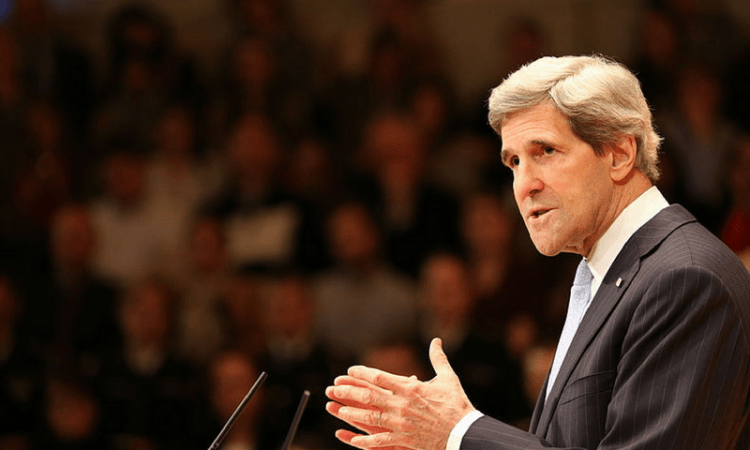Three former Obama Secretaries of Defense have recently expressed grave concern that a widespread bias in the nation’s culture has penetrated the Oval Office: the United States now has a commander-in-chief who roundly dislikes the military.
At the same time, the Department of State is an agency that many Americans say they place above the military as an arbiter of the nation’s values.
The idea is short enough to fit on a baseball cap: State Dept Yes, Pentagon No.
One of the people who set this train of thought in motion is John F. Kerry. As a young serviceman, Kerry publicly accused the entire U.S. army of committing war crimes in Vietnam.
Today, as Secretary of State, he is diplomat-in-chief for a policy whose trademark is its resistance to using America’s military might.
Kerry has made his way on the back of an idea that was unoriginal to him, and more a cliché than an idea. For that combination of qualities, he might be dubbed Captain Obvious.
In the war-torn areas of the world, Kerry can still pass as a man of conscience who knows about the dangers of militarism. In areas that are free of military conflict, however, you get an unclouded view of the man and the policy.
In Guatemala, the U.S. is able to act without the constraint or reserve it currently feels about the overt use of force. The result, as it happens, is a naked display of American power — a veritable “Diplomats Gone Wild.”
Guatemala has been living since 1996 in an unsteady truce — the continuation of war by other means. The Marxist guerrilla faction that failed to overthrow the republic, and failed to win electoral popularity, has today maneuvered itself into a dominant position and continues hatching schemes to seize power.
Obama’s administration, first under Madame Secretary and now under Captain Obvious, has been steadfastly working on behalf of the guerrilla cause. The policy is, among other things, an obvious extension of what Kerry suggested in 1971: a Vietnamese communist victory would be preferable to an American one.
In Guatemala, successive U.S. ambassadors have recognized as «human-rights groups» the Marxist militias which are now holding much of the rural populace captive, forbidding economic development projects and treating the peasants like slaves.
The rule of the militias has spread poverty, reduced economic opportunity and — ironic in view of US support — sent larger numbers of immigrants to the U.S.
U.S. ambassador Todd Robinson—today recognized as Guatemala’s de facto president — has been telling the country’s ostensible president whom he may appoint to positions in the executive branch, and whom he may not.
Most recently, Ambassador Robinson ran interference in the Guatemalan congress for a guerrilla sympathizer who was seeking re-election to the country’s highest court. The congress, intimidated by the ambassador’s power, approved his candidate by a vote of 145 to 6.
Robinson’s heavy-handed role got to be so blatant that the Vatican’s ambassador, last month, made a veiled criticism of it. “No country,” he said, “can permit such interference because, far from helping a country in need, it increases tensions and prioritizes things that are not the most important. . . .”
The Archbishop of Guatemala, apparently feeling that the papal ambassador had been too indirect, made the matter explicit. “One can clearly see,” he said, “that this was directed at the U.S. ambassador. . . .”
“In the list of priorities, for me sovereignty is last . . . ’’ Robinson shot back. “The words of the ambassador are worth nothing to Guatemalans [on] important issues.”
Robinson is presently leading the campaign against Guatemala’s sovereignty. The president of Guatemala’s congress was caught on tape saying that the U.S. ambassador now gives orders directly to him; a TV station played the tape.
Captain Obvious has surely had a finger on the pulse of these policies. But where he has really come alive is in the abusive punishments that Obama’s government has engineered for the former army officers who spent decades rescuing Guatemala from a Marxist takeover.
In 2014, Kerry’s State Department gave an award to a ramrodding judge who had tried to impose a guilty verdict in the Ríos Montt genocide trial. Guatemala’s highest court threw out the verdict, for good reason; but the fact apparently did not register on Captain Obvious, who went out of his way to praise the judge and hail the trial as precedent-setting, when the trial had not even concluded. Today, sixteen months after Kerry’s valedictory statement, the genocide trial still has not concluded.
In early 2016, the same judge who had violated procedure in the genocide trial was leading another prominent case with military defendants. In it, two ex-officers were given effective life sentences without being allowed to confront the witnesses against them. Robinson attended that trial and praised it lavishly.
So it seems that, 45 years after launching his career by accusing the U.S. military of war crimes in Vietnam, John Kerry will end his career by trying to bury the Guatemalan officer corps.
Quite a symmetry, isn’t it? Even Captain Obvious would have to say yes.
This article first appeared in the Daily Caller.
 Join us in our mission to foster positive relations between the United States and Latin America through independent journalism.
Join us in our mission to foster positive relations between the United States and Latin America through independent journalism.
As we improve our quality and deepen our coverage, we wish to make the Impunity Observer financially sustainable and reader-oriented. In return, we ask that you show your support in the form of subscriptions.
Non-subscribers can read up to six articles per month. Subscribe here.

